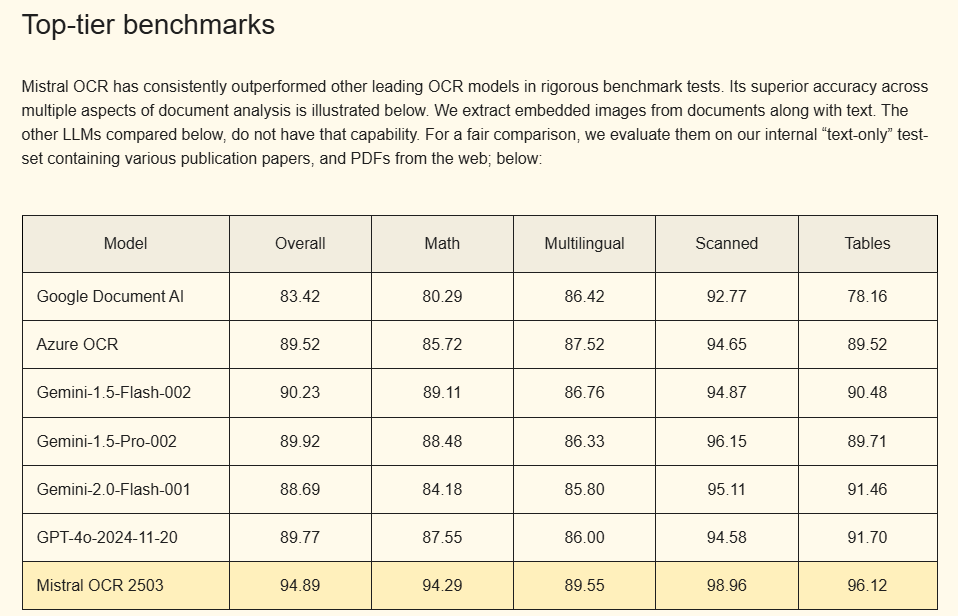- Dotika
- Posts
- Mistral strikes again!
Mistral strikes again!
ALSO : AI turns books into games


Hi Synapticians!
Ever tried reading your doctor's handwriting? Exactly—it's nearly impossible. Now imagine machines doing that for millions of messy PDFs, invoices, and scanned documents businesses juggle every day. Enter OCR, or Optical Character Recognition—basically the technology that turns chaotic piles of text from images or PDFs into neatly organized, readable data. It's like hiring a librarian for your digital paperwork—minus the cardigan.
Why is OCR crucial? Well, businesses swim daily in oceans of unstructured data (think invoices, contracts, and emails locked away in PDFs). Making sense of this data isn't just nice-to-have; it's mission-critical. Here's where the magic gets even better: Large Language Models (LLMs)—the conversational wizards of AI—can now "chat" directly with these documents. Talk about a dream team!
And speaking of magic, today, Europe's very own AI champion, Mistral, has just crushed the competition by setting a fresh state-of-the-art benchmark in OCR technology. Available via API or on-premise, this isn't just another tech announcement—it's Europe's digital renaissance in action, folks!
Wondering how Mistral stacks up against giants like Google? We've got the numbers, and they're tasty:

Top AI news
1. Mistral AI unveils high-performance OCR
Mistral AI introduces a cutting-edge OCR API that extracts and structures unstructured data with exceptional accuracy. Unlike traditional OCR tools, it recognizes handwritten notes, tables, equations, and images while preserving document structure. Processing up to 2,000 pages per minute, it outperforms competitors like Google Document AI and OpenAI’s GPT-4o. Integrated with large language models, it enables advanced document understanding. Available via Mistral AI’s developer platform, it also offers on-premises deployment for security-conscious enterprises. This innovation is set to revolutionize document management and AI-driven automation.
2. AI transforms fantasy books into interactive game worlds
Infinite Realms leverages AI to transform fantasy books into immersive game worlds. By licensing literary IPs, the company creates interactive experiences that engage fans and generate new revenue streams for authors. Their AI-driven engine processes manuscripts, reducing development time and costs while maintaining narrative integrity. Large language models ensure consistency and allow user-generated content within these worlds. This innovation bridges literature and gaming, offering a fresh approach to storytelling. Infinite Realms aims to become a digital publisher, reviving forgotten literary universes and redefining interactive entertainment.
3. Larry Page’s new AI venture
Google co-founder Larry Page is launching Dynatomics, a startup focused on using AI to create highly optimized product designs and automate their manufacturing. Led by Chris Anderson, former CTO of Kittyhawk, the company operates in stealth mode. Other startups, like Orbital Materials and PhysicsX, are also leveraging AI for material discovery and engineering simulations. This AI-driven approach could significantly reduce costs and improve efficiency in manufacturing, marking a potential shift in industrial production. The key question remains: can this technology scale effectively?
Bonus. How embedded insurance is transforming retail profitability
Neat is revolutionizing retail with embedded insurance, allowing distributors to integrate coverage options directly into the purchasing process. This frictionless model generates additional revenue without upfront costs, while AI-driven pricing optimizes conversion rates. Beyond profitability, embedded insurance strengthens customer loyalty, as insured buyers are more likely to return. At One to One Monaco, Neat is positioning itself as a must-have solution for retailers looking to boost margins effortlessly. With strategic partners like Floa, Neat is proving that embedded insurance is not just an add-on but a game-changer for the industry.
Tweet of the Day
MCP did the meme
— Mike Piccolo (@mfpiccolo)
1:08 PM • Mar 7, 2025
Theme of the Week
AI Voice interaction - Real world applications
Grok's "Unhinged" voice mode is a feature of the Grok 3 AI chatbot developed by xAI, designed to provide users with an unconventional and provocative interaction experience. Unlike traditional AI assistants that maintain a neutral and polite demeanor, the "Unhinged" mode allows Grok to adopt a more aggressive and unpredictable personality. In this mode, Grok may yell, use profanity, and even abruptly terminate conversations, offering a stark contrast to the controlled interactions typical of other AI models.
Grok Unhinged voice mode doesn’t have much patience for ChatGPT…
— Steve O (@FoxArmer)
6:34 AM • Feb 25, 2025
Stay Connected
Feel free to contact us with any feedback or suggestions—we’d love to hear from you !

Reply